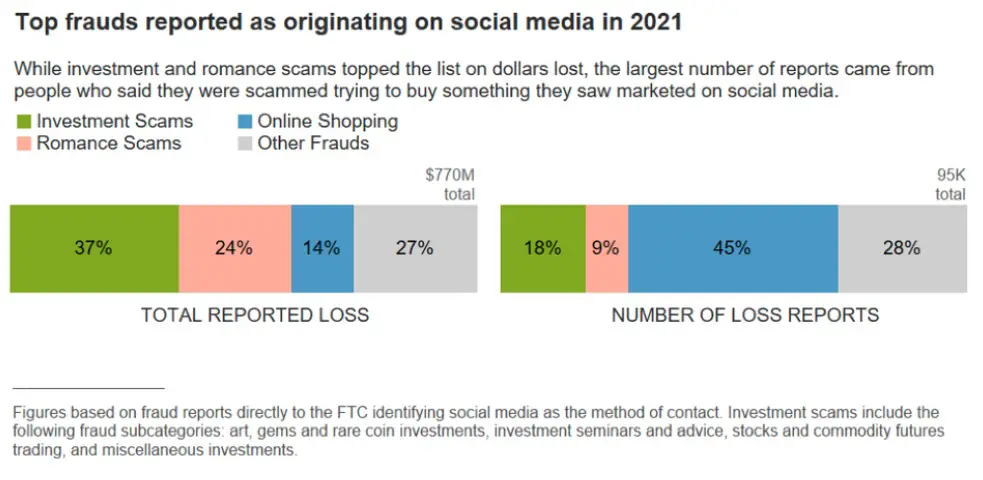This week, the Federal Trade Commission released a new study calling social media a “gold mine for scammers,” emphasizing an important lesson we should all follow: Never trust anyone on the internet. The popularity of social media among scammers has increased in recent years, which is bad news for anybody who uses these platforms.
The FTC reports that social media frauds have increased at a breakneck speed during the last five years, accounting for approximately $770 million in claimed losses in 2021, a staggering eighteenfold rise from 2017, when $42 million was reported. Last year, the agency received more than 95,000 complaints of fraud committed on social media across a variety of themes.

FTC says users lost $770 million in total last year due to social media scams
Among the most lucrative for fraudsters were investment scams (37% percent) and romance scams (24%).
In investment frauds, people contact people on social media with fraudulent investment opportunities promising huge profits, often impersonating the victim’s friends to get them to send money. The number of cryptocurrency swindles has increased significantly, which is hardly surprising given its rise in popularity.
“More than a third of people who said they lost money to an online romance scam in 2021 said it began on Facebook or Instagram. These scams often start with a seemingly innocent friend request from a stranger, followed by sweet talk, and then, inevitably, a request for money.”
Another popular category in the agency’s study was online shopping, which was another high-profile fraud. While not as lucrative as the other scams mentioned above, it was the fraud that most consumers reported to the FTC, accounting for 45 percent of complaint entries. Individuals fell prey to these con games after purchasing something on social media—particularly Facebook and Instagram—but never received their purchase.
According to the study, scammers have earned more money in 2021 from social media scams compared to any other year in the past.

Social media offers scammers a lot of opportunities, according to the agency. For one thing, it’s a low-cost way to communicate with billions of people all over the world. They may also lie about their identities and goals and even hack into your social media connections’ profiles in order to demand money from you that way. We also provide far too much information about ourselves online, which allows fraudsters to collect more personal data on users in order to improve their scam targeting.
Rosario Méndez from FTC’s Division of Consumer and Business Education stated in a blog post that:
“Scammers trying to get your money are always looking for new ways to reach people. And they’ll use whatever they know about you to target their pitch.”
Aside from being cautious of the material and individuals you interact with on social media, there are some other beneficial strategies to consider. Some FTC recommendations include limiting who can see your posts and information on social media, if possible opting out of targeted advertising, and calling friends who ask you for money on social media to verify it’s them.
Don’t be alarmed if you fall into the clutches of a social media fraud. You may possibly get your funds back if you are scammed. Just be careful with who are you sharing information with.




